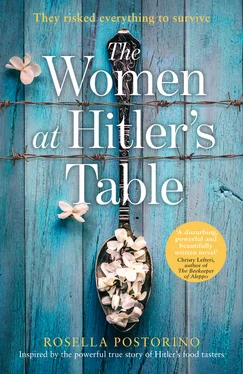1 ...6 7 8 10 11 12 ...15 The following paragraphs were crossed out. The lines covering the sentences to render them illegible disturbed me. I tried to decipher the words, but to no avail. And yet today I no longer know what to think, Gregor had written. He usually avoided writing compromising things, fearing the mail was opened and censored. His letters were brief—so brief that at times they seemed cold. The dream he’d had must have made him lose control, later forcing him to cross it out, and violently so; in some places the lines had torn through the page.
Gregor never dreamed, or so he claimed, and he used to tease me because of the importance I attributed to my dreams, almost as though they had revelatory power. He was worried about me, that was why he had written such a melancholy letter. For a moment I imagined the front would send me back a different man and I wondered if I would be able to bear it. I was shut up in the very room where he had dreamed as a little boy but I didn’t know his childhood dreams, and being surrounded by what had once belonged to him wasn’t enough to make him feel close. It wasn’t like when we used to share a bed in our rented apartment and he would fall asleep on his side, arm outstretched to clasp my wrist. Reading in bed, as always, I would turn the pages of my book with only one hand so as not to detach myself from his grasp. At times he flinched in his sleep, his fingers tightening around my wrist as though some spring mechanism had been triggered, and then relaxing again. Who could he cling to now?
One night my arm grew stiff and I wanted to change positions. Gently, trying not to wake him, I pulled my hand free. His fingers curled up around nothing, grasped empty space. At the sight of it, all the love I felt for him had risen to my throat.
It’s strange to know you’re at my parents’ house without me there as well. I’m not one to get emotional, yet recently it’s happened to me when I imagine you wandering the rooms, touching the old furniture I grew up with, making jam with my mother. (Thank you for sending me some. Give a kiss to her for me, and tell my father I say hello.)
I need to sign off now. Tomorrow morning I wake at five. The Katyusha organ plays around the clock, but we’ve grown used to it. Survival, Rosa, is all a matter of chance. Don’t worry, though—by now I can tell from the whistle of the bullets whether they’ll fall close by or far away. Besides, there’s a superstition that I’ve learned in Russia: it says that as long as your woman is faithful, soldier, you’ll never be killed. So I suppose I have no choice but to count on you!
To make up for my prolonged silence I’ve written quite a bit, so I hope you find no reason for complaint. Tell me about your days. I simply can’t imagine a woman like you living in the countryside! You’ll get used to it soon enough. You’ll like it, you’ll see. Tell me about this job of yours, too. You said you would describe it to me in person, that it was better not to do so by letter. Have I reason to be concerned?
I’ve saved the best for last, a surprise: I’ll be coming home on leave for Christmas and staying for ten days. We’ll celebrate together, for the first time, in the place where I grew up, and I can’t wait to kiss you.
The letter in my hands, I rose from the bed and reread it. I wasn’t mistaken, he really had written it. Gregor was coming to Gross-Partsch!
I look at your photograph every day. Since I always keep it in my pocket, it’s getting awfully worn. It now has a crease that crosses your cheek like a wrinkle. When I return you’ll have to give me another one, because in this one you look older. You know what I say, though? You’re even beautiful old.
Gregor
“Herta!” I rushed out of the room, waving the letter in the air. “Read this part here!” I pointed to the lines where Gregor mentioned his leave—only those, as the rest were between me and my husband.
“He’ll be here for Christmas …,” she said, almost in disbelief. She was eager for Joseph to come home so she could give him the good news.
The uneasiness I had felt just minutes earlier was gone; happiness had drowned out every other possible emotion. I would take care of him. We would share a bed again, and I would hold him so close that he would no longer be afraid of anything.
7 Chapter 7 Chapter 8 Chapter 9 Chapter 10 Chapter 11 Chapter 12 Part Two Chapter 13 Chapter 14 Chapter 15 Chapter 16 Chapter 17 Chapter 18 Chapter 19 Chapter 20 Chapter 21 Chapter 22 Chapter 23 Chapter 24 Chapter 25 Chapter 26 Chapter 27 Chapter 28 Chapter 29 Chapter 30 Chapter 31 Chapter 32 Chapter 33 Chapter 34 Chapter 35 Chapter 36 Chapter 37 Chapter 38 Chapter 39 Chapter 40 Chapter 41 Chapter 42 Chapter 43 Part Three Chapter 44 Chapter 45 Chapter 46 Chapter 47 Chapter 48 Notes and Acknowledgments About the Publisher
Sitting around the hearth, we daydreamed about Gregor’s return. Joseph planned to kill a rooster for our Christmas dinner and I wondered whether I would have to eat at the lunchroom that day. What would Gregor do while I was at the barracks? I was jealous of the time Herta and Joseph would spend with him while I was gone.
“Maybe he could come to Krausendorf. After all, he’s a soldier in the Wehrmacht.”
“No,” Joseph told me, “the SS wouldn’t let him in.”
We ended up talking about Gregor as a child. We often did. My mother-in-law told me that until he was sixteen he had been a slightly chubby boy.
“He had red cheeks, even when he wasn’t running around. It often looked like he’d been drinking.”
“Actually,” Joseph said, “he did get drunk once.”
“Why, that’s right!” Herta exclaimed. “Oh, what memories you’ve made me recall … Listen to this, Rosa. He might’ve been seven, no older than that. It was summer, we came back from the fields and found him lying right there on that chest.” She pointed at the wooden trunk by the wall. “He was so happy. ‘Mother,’ he says, ‘that juice you made is delicious.’”
“On the table was an open bottle of wine,” Joseph said, “almost half empty. ‘Good god,’ I ask him, ‘why did you drink that?’ And he says, ‘Because I was really thirsty.’” Joseph laughed.
So did Herta. She laughed herself to tears. Watching her arthritis-twisted hands wipe her eyes, I thought of all the times they had caressed Gregor when he awoke, had brushed his hair from his forehead as he ate breakfast—thought of all the times they had scrubbed every last inch of his filthy body when he returned in the evening, exhausted from his fierce battles at the edge of the marsh, a slingshot sticking out of his shorts pocket. All the times she had slapped him and then, sitting in her room, had wanted to cut off the hand that caused such disgrace—the disgrace of striking someone who was once you and was now another human being.
“Then he grew up, grew tall, all at once,” Joseph said. “Sprouted up overnight, like he’d soaked his feet in water.”
I imagined Gregor as a plant, a towering poplar tree, just like the ones lining the road to Krausendorf—wide, straight trunk; clear bark speckled with lenticels—and longed to embrace him.
From then on I counted the days by crossing them off the calendar with X ’s, each X shortening the wait by a little bit. To fill the time, I followed a self-imposed routine.
In the afternoons, before getting back on the bus, I would go to the well with Herta to get water, and when I returned I fed the hens. I would leave the feed in the henhouse and they would rush over and peck at it, twitching anxiously. There was always one who couldn’t squeeze her way into the group and would lash her head left and right, wondering what to do, or maybe she would only do so in dismay. Her scrawny head was disconcerting to me. Letting out a deep belly-squawk, the hen would scurry around in search of a gap and then thrust herself between two of her companions, shoving one of them out of the way. With this, the balance of power would change again. There was food for all of them, but the hens never believed it.
Читать дальше












